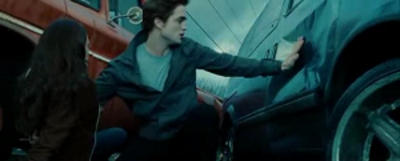 What’s that you say? A blatantly-cliched, Designated Romance has achieved undeserved popularity through canny advertising and a near-religious fandom of desperate, everyday Americans who don’t know Romance from their own house cats? And you’re actually surprised by this? Am I the only one who’s wondered how large a structure one could build from all the VHS copies of Titanic everyone bought in 1998, watched once…and never bothered with again? The only one who’s noticed that to read Twilight is to read your girlfriend’s old high school diary with all the proper names replaced by “Edward” and all the sex expunged?
What’s that you say? A blatantly-cliched, Designated Romance has achieved undeserved popularity through canny advertising and a near-religious fandom of desperate, everyday Americans who don’t know Romance from their own house cats? And you’re actually surprised by this? Am I the only one who’s wondered how large a structure one could build from all the VHS copies of Titanic everyone bought in 1998, watched once…and never bothered with again? The only one who’s noticed that to read Twilight is to read your girlfriend’s old high school diary with all the proper names replaced by “Edward” and all the sex expunged?
Turgid, repetitive, and ill-paced, the Twilight saga is a series of books designed to be picked up and put down between the soul-deadening chores of “normal” everyday American life…which fits, considering that’s exactly how it was written. (You try crafting a piece of literature with a house full of teenage boys.) Author Stephanie Meyer insists she’d never read a vampire story or seen a horror film before beginning her magnum opus, and you know what? I believe her. Twilight is exactly what someone who’s never allowed themselves to experience a vampire story would dream up, given half a chance and a boring life in the suburbs of Phoenix…surely the most forsaken place on Planet America…outside of Southwest Missouri.
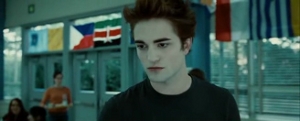 In the end, Meyer’s real cultural sin is one of masquerading. Rappers used to call it “perpetratin’ like she’s down.” Down with genre literature’s ability to explore ideas and articulate concepts that might be a bit beyond the everyday concerns of rough humanity. Instead, Meyer is plainly “down” with a different crew: Jane Austin, the Bronte Sisters, and L. M. Montgomery. All great names in very mundane literature. What, we wonder, gives this representative of Old School Chick Lit permission to play in our genre sandbox? What mad logic compelled her to use our toys to play her silly, 19th century games? Where manners and etiquette substitute for ideas and Love is our only worthwhile Plot Device?
In the end, Meyer’s real cultural sin is one of masquerading. Rappers used to call it “perpetratin’ like she’s down.” Down with genre literature’s ability to explore ideas and articulate concepts that might be a bit beyond the everyday concerns of rough humanity. Instead, Meyer is plainly “down” with a different crew: Jane Austin, the Bronte Sisters, and L. M. Montgomery. All great names in very mundane literature. What, we wonder, gives this representative of Old School Chick Lit permission to play in our genre sandbox? What mad logic compelled her to use our toys to play her silly, 19th century games? Where manners and etiquette substitute for ideas and Love is our only worthwhile Plot Device?
As with so much else, H.P. Lovecraft, everyone’s favorite dead racist, has the answer (though the emphasis is mine):
Relatively few are free enough from the spell of the daily routine to respond to tappings from outside, and tales of ordinary feelings and events, or of common sentimental distortions of such feelings and events, will always take first place in the taste of the majority; rightly, perhaps, since of course these ordinary matters make up the greater part of human experience. But the sensitive are always with us, and sometimes a curious streak of fancy invades an obscure corner of the very hardest head; so that no amount of rationalisation, reform, or Freudian analysis can quite annul the thrill of the chimney-corner whisper or the lonely wood.
In other words, Twilight came to her in a dream…minus the damned ending. Meyer decided to make up her own and here we are, four books and one thirty-seven million dollar film later. Just for scale, $37 million is the annual municipal budget of West Windsor, New Jersey. That’s right: you could run a 25,000-people-strong township for a whole frickin’ year on what it cost to make this film. Frankly, I’m surprised the end result looks so cheap. These days, you need $37 million just to have dinner with Michael Bay and all he’ll do is spend the meal flicking food at you like a crack-addled four-year-old eager to get back to his G.I. Joe action figures.
In any case, Bella Swan (Kristen Stewart) is your usual Pretty White Kid. Her Problem? Aside from living in Phoenix, it seems her Mom picked a minor league baseball player for a second husband. Rather than follow them around, Bella elects to move back in with her dad, Charley (Billy Burke), the best drunken gun-cleaner in the entire town of Forks, Washington…and, therefore, it’s chief of police.
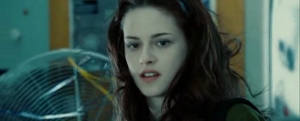 It’s amazing how rarely Twilight fans mention Bella, saving their most lavish praise for our Other Protagonist, Edward Cullen (Robert Pattinson). This is because Bella is one of the flattest, least-interesting, most-ridiculously-helpless Girl Protagonists in all of modern literature, the new Queen of the Marry Sues. All the Sue lights flash John Ashcroft-red in Bella’s unfortunate presence. Her (1) false-modesty betrays the fact that (2) she’s immediately the center of everyone’s attention, (3) borrowing every major physical attribute from her creator in a blatant case of authorial self-insertion. This makes Bella’s (4) overly descriptive name (I mean, Jesus Christ, dude: “Beautiful Swan”?) and (5) obvious Non-Flaw (“clumsiness”) necessary distractions from (6) how inordinately perfect she is, and how little she appreciates the things around her. Apart from Edward Cullen.
It’s amazing how rarely Twilight fans mention Bella, saving their most lavish praise for our Other Protagonist, Edward Cullen (Robert Pattinson). This is because Bella is one of the flattest, least-interesting, most-ridiculously-helpless Girl Protagonists in all of modern literature, the new Queen of the Marry Sues. All the Sue lights flash John Ashcroft-red in Bella’s unfortunate presence. Her (1) false-modesty betrays the fact that (2) she’s immediately the center of everyone’s attention, (3) borrowing every major physical attribute from her creator in a blatant case of authorial self-insertion. This makes Bella’s (4) overly descriptive name (I mean, Jesus Christ, dude: “Beautiful Swan”?) and (5) obvious Non-Flaw (“clumsiness”) necessary distractions from (6) how inordinately perfect she is, and how little she appreciates the things around her. Apart from Edward Cullen.
Edward (Robert Pattinson) is a scion of the family Cullen, the town doctor’s pasty, insular, sun-despising clan of (ahem) “foster kids” who never eat or drink within anyone’s sight and are “too cool” for Forks inordinately-large high school scene. Yet no one in town seems to notice (not even as a cruel joke of the type high school kids are wont to make about “those people” around the lunch table, whomever “those people” might be) that the whole pack of them are goddamn shit-sucking vampires. I swear, these Forkians (Forkanites?) make the inhabitants of Sunnydale, California look like century-farmers from the Transylvanian highlands.
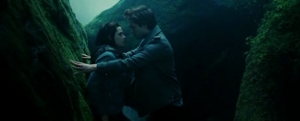 In any case, you know this story. Girl meets vampire in Bio Class (the only class at Forks High, apparently…other than gym…budget cuts, you know; standardized tests don’t fund themselves). Vampire seems initially and thoroughly repulsed by her (I sympathize). Girl ignores all the (human) guys who’ve been vying for her affections since the minute she arrived, all but melting into semi-gelatinous puddles at her unappreciative feet, like the protagonists of Tex Avery cartoons. Girl pretty much ignores all of the other girls too, despite the fact that they’ve welcomed her to town with open arms and some of the most innocuous “teenage” banter this side of a Glee episode. Girl almost completely ignores her father as well, who seems to spend all of his off-duty hours drinking and staring off into the existential void of middle age (allowing the Girl to cook and do all his dishes – training for her future life as a Twilight fan). Instead, Girl broods over why in the hell that vampire can’t look at her without stifling the urge to vomit up his own intestines?
In any case, you know this story. Girl meets vampire in Bio Class (the only class at Forks High, apparently…other than gym…budget cuts, you know; standardized tests don’t fund themselves). Vampire seems initially and thoroughly repulsed by her (I sympathize). Girl ignores all the (human) guys who’ve been vying for her affections since the minute she arrived, all but melting into semi-gelatinous puddles at her unappreciative feet, like the protagonists of Tex Avery cartoons. Girl pretty much ignores all of the other girls too, despite the fact that they’ve welcomed her to town with open arms and some of the most innocuous “teenage” banter this side of a Glee episode. Girl almost completely ignores her father as well, who seems to spend all of his off-duty hours drinking and staring off into the existential void of middle age (allowing the Girl to cook and do all his dishes – training for her future life as a Twilight fan). Instead, Girl broods over why in the hell that vampire can’t look at her without stifling the urge to vomit up his own intestines?
Even the Saga‘s most vocal detractors cite Bella’s instant obsession with the moody, “attractive” Edward as the one realistic moment in an otherwise bullshit-laden piece of tawdry, YA fiction. But they, like the makers of Twilight, are forgetting their high school experiences, insulating the no-doubt-painful memories in a downy-soft blanket of nostalgia. Being a Marry Sue, and thus perfect in every way, Bella is above the capricious meanspiritedness that drives most teenage girls. While the novel allowed for some explanation of why and how this is, the movie must move forward, even if only at a snail’s pace. This flattens and distorts a set of characters that were never more than one-dimensional stand-ins in the first place, leaving me not only bored, but doing what I always do in these cases: actively praying for their deaths.
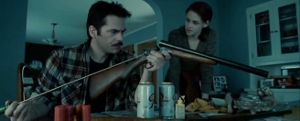 In any fucking case, Edward’s cold to the touch, spiteful, and fond of sending mixed messages. After rescuing her from what is still the most flagrant Smallville rip-off in the entire Saga, Edward tells her, “We shouldn’t be friends.” You’d think, if you had over a century to practice interpersonal communication, you’d have figured out a better trick than the old “I-love-you-now-go-away” game. Ah, but ten more minutes find Edward rescuing Bella from yet another superhero trope: the gang of toughs who lurk in darkened alleys, waiting for nubile teenage girls to walk home in the dark.
In any fucking case, Edward’s cold to the touch, spiteful, and fond of sending mixed messages. After rescuing her from what is still the most flagrant Smallville rip-off in the entire Saga, Edward tells her, “We shouldn’t be friends.” You’d think, if you had over a century to practice interpersonal communication, you’d have figured out a better trick than the old “I-love-you-now-go-away” game. Ah, but ten more minutes find Edward rescuing Bella from yet another superhero trope: the gang of toughs who lurk in darkened alleys, waiting for nubile teenage girls to walk home in the dark.
“I feel very…protective of you,” Ed says. “I was trying to keep a distance unless you need my help.” Stalking you, in other words. Oh, and he can read minds. Except Bella’s. Not that this will have anything to do with anything; it’s just one more reiteration of how “special” Bella Sue is.
A series of suspicious “animal attacks” soon lead Bella to the series’ first mislead. And I must say, I never thought I’d see a film bring the thrill of Google searching to the silver screen this soon. Going in, I expected this to be a massive does of set-up for the next three (or four) flicks in the cycle…but I never expected the film to deliver two hours of pure, uncut set-up right to the main line. I’m not sure my brain could take it all if I didn’t already know where this is going. God help the poor souls who stumbled into this film in ignorance, only to find the most boring vampire film since Andy Warhol’s Dracula. Never has the screen seen two lovers with less chemistry between them (unless you count the Star Wars prequels…or Titanic…or Avatar…or…Michael Bay’s Transformers). Never have ILM special effects seemed less special, only a few tiers removed from cheap, music video tricks (or Tex Avery cartoons). Never before have I sat in anticipation of vampire sparkliness only to find that it wound up looking even less impressive than I imagined.
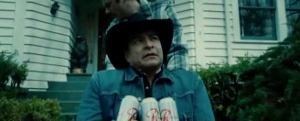 In fact, all of this feels like the early cut of an unfinished film producers from the nineteen nineties shoved into a box for fear of boring their audience to tears. Every non-Native American in the film (and, hell, them too) seems drawn straight from old WB Central Casting. This ironically makes our designated-pretty vampires that much blander (while it might explain how they can waltz about “incognito”) and that much harder to accept. Hard for the Cullens to be paragons of hotness in a world populated by Powerhouse-kids. For this story to work, the Cullens would have to be the irresistible, overly-sexualized predators Edward believes himself to be and monologues about (at length) during the now-legendary Mountaintop Scene, wherein Bella finally learns what we’ve all been shouting at the TV since Edward first walked into her life.
In fact, all of this feels like the early cut of an unfinished film producers from the nineteen nineties shoved into a box for fear of boring their audience to tears. Every non-Native American in the film (and, hell, them too) seems drawn straight from old WB Central Casting. This ironically makes our designated-pretty vampires that much blander (while it might explain how they can waltz about “incognito”) and that much harder to accept. Hard for the Cullens to be paragons of hotness in a world populated by Powerhouse-kids. For this story to work, the Cullens would have to be the irresistible, overly-sexualized predators Edward believes himself to be and monologues about (at length) during the now-legendary Mountaintop Scene, wherein Bella finally learns what we’ve all been shouting at the TV since Edward first walked into her life.
He’s a vampire, you see, turned back during the Spanish Influenza by a high-minded sire named Carlisle (Peter Facinelli), who figured there was no real need to go around murdering people when animals would do you just as well. Carlisle’s sojourned through the world ever since, gathering like-minded bloodsuckers to his side, offering them an unlife of perpetual self-denial in a succession of the darkest, rainiest, dankest, most redneck-infested holes in America (and, presumably, the world). What vampire wouldn’t jump at a chance like that?
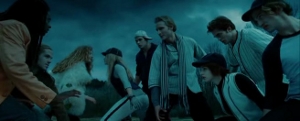 Any vampire under the sun, that’s who. And since so much of this is set-up, we spend a loo-oong ass time setting up the Cullen family, and Edward’s conflict-which-isn’t-really-a-conflict. Since Bella’s such a flat, boorish excuse for a human being, Edward’s lust for her is really a lust for her blood. She’s his “own personal brand of heroin,” you see. Try that pick-up line sometime, see just how far it gets you. Or how about: “I wanted to kill you…I’ve never wanted a human’s blood so much in my life.” Because he’s “a killer,” you see, “the world’s most dangerous predator.” He needs to tell us this because the film refuses to show us anything that might back up Ed’s melodramatic posturing. Doing so would not only depart from the novel, it might undermine the whole vampires-are-dreamy-sexpots thing Meyer (and her adapters) are going for.
Any vampire under the sun, that’s who. And since so much of this is set-up, we spend a loo-oong ass time setting up the Cullen family, and Edward’s conflict-which-isn’t-really-a-conflict. Since Bella’s such a flat, boorish excuse for a human being, Edward’s lust for her is really a lust for her blood. She’s his “own personal brand of heroin,” you see. Try that pick-up line sometime, see just how far it gets you. Or how about: “I wanted to kill you…I’ve never wanted a human’s blood so much in my life.” Because he’s “a killer,” you see, “the world’s most dangerous predator.” He needs to tell us this because the film refuses to show us anything that might back up Ed’s melodramatic posturing. Doing so would not only depart from the novel, it might undermine the whole vampires-are-dreamy-sexpots thing Meyer (and her adapters) are going for.
And there’s my real bone of contention with all this. Long before Buffy gave Angel his first introductory kick to the chest, vampires served as potent metaphors for the kind of obsessive-compulsive, smothering, sexual attraction so prevalent in today’s selfish, bastardly society. If this were yet another story about Brooding Immortals and the audience identification characters who love them we’d be safely inside territory the first Highlander film covered in a five minute music video sequence. Watching it stretched to ninety minutes would at least be bearable.
But in our modern world, every vampire has to be an angst-ridden Ubermenchen, cursed by the blessings of eternal youth and beauty; prisoners at the top of the planetary food chain. They’ve become a much more potent metaphor for post-industrial alienation than anything having to do with sexuality. They’re “special” in all the ways we puny humans wish we were, but that very “specialty” confines them to a private underworld of gloom. There, they more-or-less waste their unlives sulking about the cosmic unfairness of it all. No one understands them, you see.
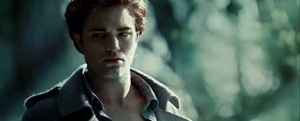 Except we all, intuitively, do. We just don’t care because, in our modern alienation, the vampire’s been reduced to little more than an off-brand, young Marlon Brando. With fangs (see also, Pattinson’s performance). They may look cool and “dangerous” (in a safely PG-13 kinda way that cuts to a wide-angle midshot of a air vent before anything actually horrifying appears on screen) but underneath the body glitter they’re really just like us. Because we’re a culture of emotional vampires, draining the lives of our “loved” ones in the hope that doing so will bolster our own, undernourished egos. We’d all love to be the Ultimate Egoist. We’d all love to shout,
Except we all, intuitively, do. We just don’t care because, in our modern alienation, the vampire’s been reduced to little more than an off-brand, young Marlon Brando. With fangs (see also, Pattinson’s performance). They may look cool and “dangerous” (in a safely PG-13 kinda way that cuts to a wide-angle midshot of a air vent before anything actually horrifying appears on screen) but underneath the body glitter they’re really just like us. Because we’re a culture of emotional vampires, draining the lives of our “loved” ones in the hope that doing so will bolster our own, undernourished egos. We’d all love to be the Ultimate Egoist. We’d all love to shout,
“My revenge is just begun! I spread it over centuries, and time is on my side. Your girls that you all love are mine already; and through them you and others shall be mine – my creatures, to do my bidding and to be my jackals when I want to feed.”
(as an actual Vampire once did to everyone standing in his way, back in 1897)
but we can’t. Only the ruling class gets away with voicing evil, bullshit thoughts like these (and even they have to dress it up in the proper marketing language). And since we’re so obviously not the rulers of our world, we’re left to feel like outcasts and misunderstood monsters. Because of this, our monsters are no longer allowed to be monstrous. At one point, Edward even whines out the Misunderstood Monsters refrain: “I don’t want [dramatic pause] to be a monster.” Neither do we. So at most the modern vampire’s monstrosities are the monstrosities of perpetual adolescence. Because nothing scares Americans more than their own fucking teenagers. Except for what those same teenagers might do if they run around unsupervised!
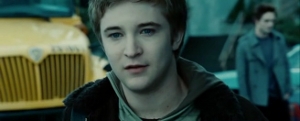 Which brings us back to Twilight, where, after an hour and half of The Bella and Edward Show, real vampires (who’ve left a trail of “animal attack” victims through the whole film) break up a Cullen family game of Vampire Baseball. Ah, good, I thought, a conflict. Something far removed from Edward’s conflict with blue balls…and his confusion of love with stalking, sex, murder, and possibly suicide. (Dude, they can all go together, they just don’t always have to.) One of the “real” vampires, James (Cam Gigandet), takes an instant shine to Bella, because that’s just what people do in this wacky, parallel universe. The entire Cullen family drops everything to protect her, but because we have to end all of this on some kind of note, somehow, Bella still manages to end up in a Climactic Fight Scene-friendly trap, listening to James monologue until Edward saves her. Again. Spoiler alert.
Which brings us back to Twilight, where, after an hour and half of The Bella and Edward Show, real vampires (who’ve left a trail of “animal attack” victims through the whole film) break up a Cullen family game of Vampire Baseball. Ah, good, I thought, a conflict. Something far removed from Edward’s conflict with blue balls…and his confusion of love with stalking, sex, murder, and possibly suicide. (Dude, they can all go together, they just don’t always have to.) One of the “real” vampires, James (Cam Gigandet), takes an instant shine to Bella, because that’s just what people do in this wacky, parallel universe. The entire Cullen family drops everything to protect her, but because we have to end all of this on some kind of note, somehow, Bella still manages to end up in a Climactic Fight Scene-friendly trap, listening to James monologue until Edward saves her. Again. Spoiler alert.
Except it’s not. There’s nothing new in Twilight because its author locked herself into the cave of bourge Americana and missed the last twenty years of what I, with what I assure you is great deal of laughter, call “innovations” in vampire fiction. The makers of this film have no such excuse, and with some honest-to-God work they could’ve, perhaps, punched this up into a competent little film. I’m particularly disappointed in screenwriter Melissa Rosenberg, who’s written several episodes of Dexter I quite liked, but who completely failed to render any of the book’s best lines to screen. The ones she added herself (assuming she actually wrote them) are unimpressive condensations or out-and-proud Exposition Storms. It’s as if she knew no one in the audience would notice anything other than Robert Pattinson’s eyebrows.
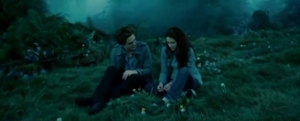 And I’m sorry, but thirty-seven million dollars will no longer buy you a convincing vampire, to say nothing of a movie full of them. Pasty-faced make-up and wire-fu just won’t cut it anymore. Especially not in the hands of directors who make skateboarder movies. But I don’t blame Catherine Hardwicke. Like most humans, she needs food. Acquiring that food requires money. Money comes form movie companies hungry to plug the franchised–shaped hole in their money silos. So Hardwicke made this film. And I understand, Catherine. I kinda liked Thirteen, and really all I want to know is…did you have to punish us as well? Did you purposefully make a film this dull in order to strangle the franchise in its infancy? Instead, you’ve doomed anyone who ever has to watch this again to walk the earth forever, an eternally damned shadow of a human being, thirsting for the blood of the innocent. Like me.At least its vaguely pretty. And Hardwicke almost can’t help herself but set-up the occasional, well-done shot.
And I’m sorry, but thirty-seven million dollars will no longer buy you a convincing vampire, to say nothing of a movie full of them. Pasty-faced make-up and wire-fu just won’t cut it anymore. Especially not in the hands of directors who make skateboarder movies. But I don’t blame Catherine Hardwicke. Like most humans, she needs food. Acquiring that food requires money. Money comes form movie companies hungry to plug the franchised–shaped hole in their money silos. So Hardwicke made this film. And I understand, Catherine. I kinda liked Thirteen, and really all I want to know is…did you have to punish us as well? Did you purposefully make a film this dull in order to strangle the franchise in its infancy? Instead, you’ve doomed anyone who ever has to watch this again to walk the earth forever, an eternally damned shadow of a human being, thirsting for the blood of the innocent. Like me.At least its vaguely pretty. And Hardwicke almost can’t help herself but set-up the occasional, well-done shot.
I also rather liked Billy Burke’s turn as Charlie because at least he, and Gil Birmingham’s Billy Black, have actual chemistry. No, not like that, you fools…I mean only that I bought the two of them as real good friends who seem to have lives independent of Bella Swan’s mawkish flightiness. Tell you what: make a ninety-minute tie-in film focused on the two of them and all the behind-the-scenes machinations undoubtedly necessary to keep a lid on Forks’ whole murder-by-supernatural-forces thing. That’s a film I’d watch. With glee. It’d sure beat the hell out of watching Stewart and Pattinson try to out-pale, out-stammer, and out-dramatic-pause each other. Maybe Stewart’ll get tired and grace us with another facial expression sometime around New Moon-rise.
Personally, after watching this film, my face is frozen in a permanent grimace of contempt. But we’ve got at least three more movies to go, Kristen. How ’bout we see who thaws out first?
![]()

Freaking awesome, Dave. I laughed, I cried, I agreed wholeheartedly! Hope you’re having a good trip!
Thank you. I am, actually. Notwithstanding the fact that it’s a trip to the dark heart of the Show-Me-Ignorant-Yahoos State. One I might actually get around to writing a travelogue about it…if “ya’ll” (as
theywe say) eat your vegetables, get to bed on time, and wash behind your ears.I’ve seen all three of the films more than once now. My wife enjoys them and I enjoy spending time with my wife. And considering some of the crap I watch and enjoy I’m not going to get on her case about the crap she enjoys.
Once the werewolves show up the series starts getting a little livelier. Or maybe I’m just deluding myself because I appreciate werewolves more than I do vampires. And by Eclipse the werewolves get to start killing vampires so there’s more action happening.
I’d be very interested to know your opinion on the distinction between “getting on one’s case” and “engaging in a wide-ranging, intellectual discussion about the finer aesthetic experience of a piece of art” – be it Picasso’s Guernica or a horrible, horrible film about a wan, pale, uninteresting serial user and the safely-PG-13 vampire who wuvs her. Example: my Significant Other is a Harry Potter fan, the likes of which I doubt few others have seen. The entire series felt like a flat, uninteresting retread of badly warmed-over tropes I’d been swimming in since age eight. But thanks to many an instance of what the objective observer might describe as “getting on her case” about it, we learned this was because of my background in mythological hero stories, one she decidedly lacked, just as I lacked her far-ranging and quite-deep background in award winning, YA fiction. Both of us profited by this mutual journey of dialectic discovery, and came out the other end stronger for it (though we both, for completely different reasons, agreed that the movies more-or-less sucked…though Chamber of Secrets had its occasional moments).
As to those werewolves…I’ll have plenty to say about that once the New Moon rises ’round these parts.
Oh, we have a good time discussing the plots and the stories of the movies we watch. We may have more fun talking about how we would have fixed a bad movie than about the merits of a good movie. We had a blast rewriting the Girl Who Played With Fire earlier this week.
And she doesn’t think the Twilight books are classics so much as comfort food fantasies. Given her family history an obsessive, immortal protector who turns you into an immortal superbeing (spoiler) is a comfort food fantasy. We still have fun noticing the Jacob is way more fun to hang out than Edward, that Alice and Emmett would be more fun to hang out with than Edward, that Edward has really failed to take advantage of his decades of life to become much of … well, anything, really.
Seriously, how dumb is it that the Cullens try to fit into the culture of a small town? Wouldn’t buying land in Alaska make more sense?
> Wouldn’t buying land in Alaska make more sense?
*G* “30 Days of Night” notwithstaanding, I’d think that vampires would go to great lengths to avoid really icy places. Being dead means that your corpus is going to match the ambient temperature, which means freezing solid after a few hours’ exposure to the cold. Granted, the glitter of the ice fields would nicely camoflauge the infamous Twilight Sparkle…
Hey, there’s an idea: vampire – *real* vampire, natch – gets caught up north and freezes for a century or so before an unusually warm summer allows him to thaw and escape to more temperate climes, only to find that the world has changed markedly from what he remembers. While the result would probably be an awkward mixture of derivative horror and ‘fish out of water’ comedy, it would still be much more interesting than any portion ‘Eclipse’…
“Quick, someone, get this man Movie Magic!”…is what I would shout if I were a movie producer. And we lived in a wacky, parallel dimension where such positions were actually open to intelligent human beings.
Unfortunately, in this one, the pungent bouquet of “originality” hanging over your idea would be the movie producer equivalent of weaponized Kryptonite.